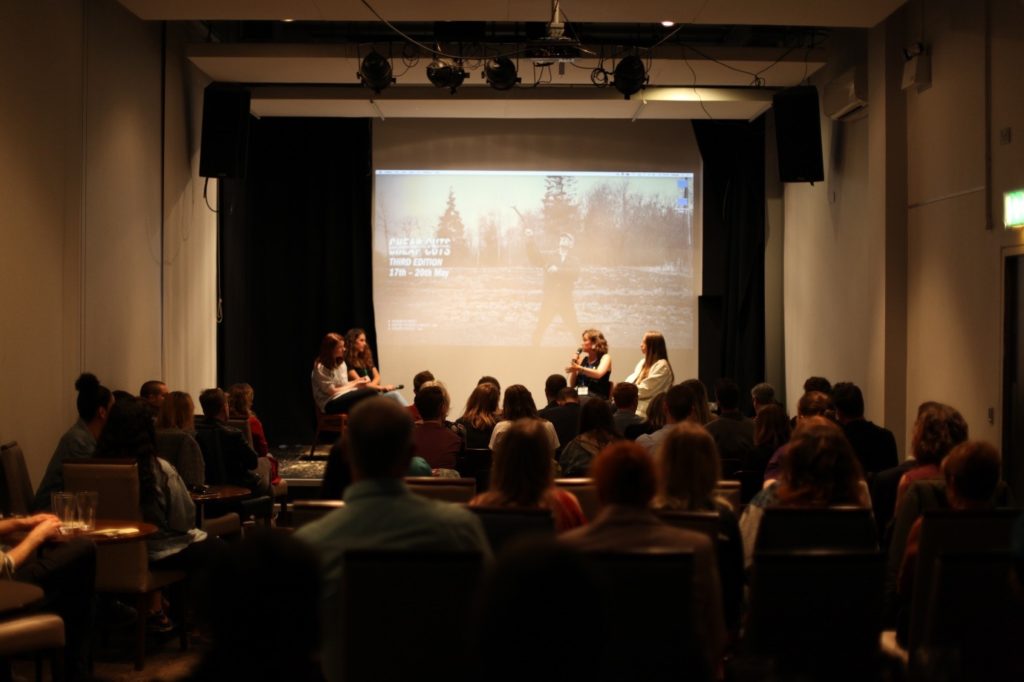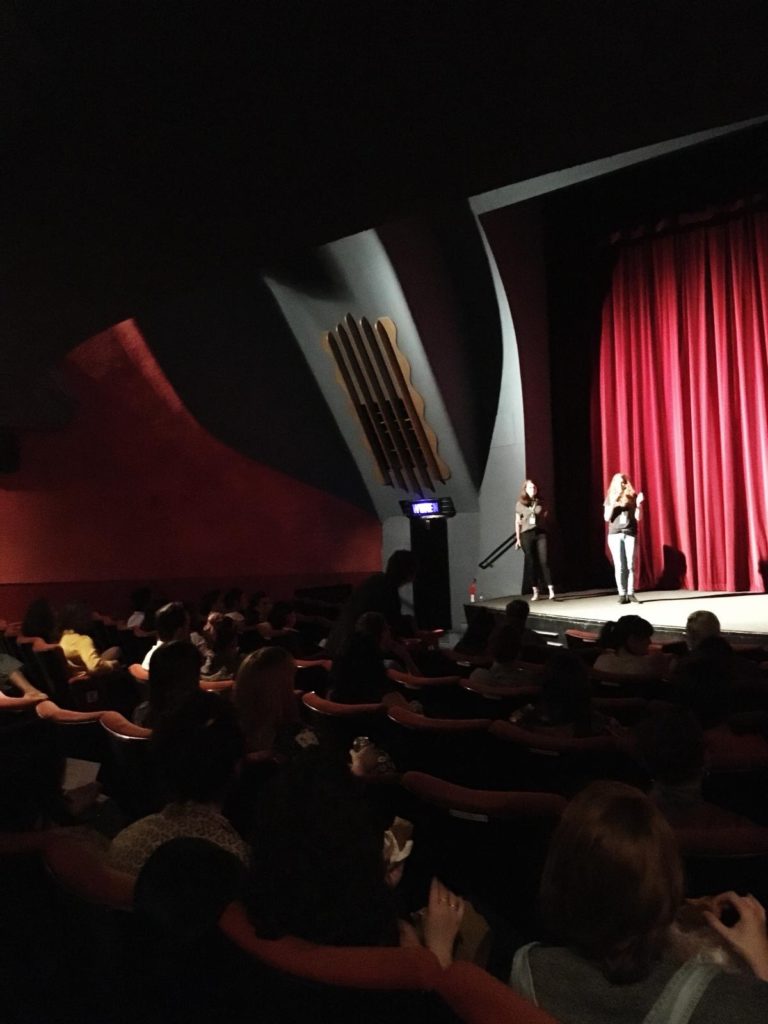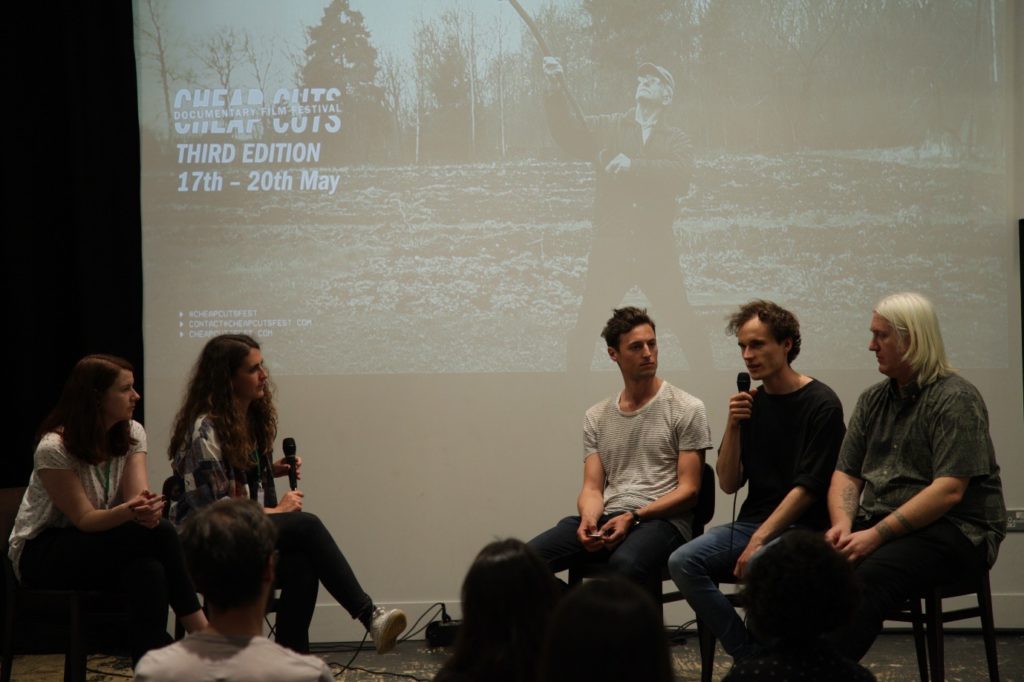Festival directors Natalia Garay Ceron and Vera Hems Anderson talk to Lynsey Ford about the past, present and future of Cheap Cuts Documentary Film Festival

Rio Cinema, Hackney | Courtesy of Cheap Cuts Documentary Film Festival
Natalia Garay Ceron and Vera Hems Anderson are the two festival directors of Cheap Cuts Short Festival who run the event in Hackney with the help of a small team of volunteers; Lucille McLennan (Festival coordinator), Dumitrita Pacicovschi, Chloe Abrahams (Assistant programmer/Production Assistant) and Laurence Dorrington (graphic designer).
The directors are based in East London and run Last Frame Club, a documentary film club in Walthamstow, where the aim is to make documentary more accessible within the borough. They also hold documentary screenings in London and across Europe, most recently in Amsterdam and Berlin.
Vera Hems Anderson studied Film & Video Production at the London College of Communication, shooting her graduation documentary in Uruguay. Vera then went on to complete her MA at Birkbeck, University of London with her dissertation focusing on documentaries shot within the United States prison system.
Natalia Garay Ceron studied Audio visual Communication at University Complutense in Madrid alongside a BA in filmmaking at Septima Ars school. She went on to complete her MA in Digital Sound. Currently Natalia is working as a production coordinator for Universal Music / Eagle Rock Entertainment, Natalia also freelances as a dubbing mixer and sound editor for fiction and documentary.

Vera and Natalia | Courtesy of Cheap Cuts Documentary Film Festival
How did Cheap Cuts start?
Vera: We started Cheap Cuts after going to several festivals and feeling there was a real lack of short documentary in the public domain. Many short film festivals focus on narrative drama, and at documentary festivals, shorts often got lost in the programme. We are both huge documentary fans and felt like there was a gap in the market for this great genre of filmmaking that wasn’t getting the attention it deserved. Short documentary is constantly consumed on platforms like Facebook and You tube, but we think it’s actually an extremely creative process that should be making its mark at festivals too.
What have been the highlights so far?
Natalia: In terms of challenges I think the most difficult one is reaching a wider audience and putting together a very well organised festival with a very limited budget, so you have to be creative and the work of all our volunteers has paid off.
Vera: One of the highlights was our sold-out weekend in 2017 at the massive Cinema Museum in Kennington, this was our second year and it was the year to decide whether to continue or not. We decided to continue and have gone even bigger this year with our programme.
The highlights of the Festival in May 2018 have been the editing workshop with Ariadna Fatjo-Vilas, an experienced editor with twenty years’ experience working in films such as The Act of Killing and Estate, A Reverie. It was a great success and a very interesting insight for all the attendants into the work that goes into preparing the edit and the process involved in creating a successful film for different platforms. Our opening night was a very busy one as well with filmmakers coming from different parts of the UK and a very engaging audience. It was a great start that set the mood for a brilliant weekend.
What would you like to introduce for future festivals?
Natalia: Next year we are going to put all our efforts in applying for funding as we have a very solid and unique festival that has grown considerably, and we are hoping to be able to grow even bigger. We would love to introduce a retrospective of shorts from well-known filmmakers and be able to bring them to London wherever possible, this is something we have always wanted to do but sometimes licenses are prohibitive. We would love to include a subtitling team that could assist with the subtitling all the films at the festival including the British ones, so we become a more accessible festival. The chief objective is to provide more affordable workshops and talks that will encourage dialogue between communities.
How has the festival grown since your first edition?
Vera: We initially intended the festival to be a one-day event with a few films on show. We opened submissions and were suddenly inundated with short documentaries from all over the globe. Overall we were really impressed with the quality and variety that was coming in to us. Our first festival took place in April 2016 in an independent gallery in Hoxton. This year the festival has taken place in two very established venues (Rio Cinema & Hackney Attic) and they are both very accessible, which was very important to us. This year’s festival was over four days so we’ve managed to double the running time for events, meaning we can show more of the films we want to, which is great.
How are the films selected for the programme?
Natalia: Each film is passed through various rounds and all submissions are viewed by the programming team, then viewed by a screener team of 10 reviewers so we can have a better idea of what audiences also want to see before they are sent on to the judges. If a film makes it to the final round, it will have been viewed a minimum of three times by different team members before being passed to the jury panel. We take into account personal taste and we consider what would appeal to different audiences. The films are decided on various factors - we try to give space to filmmakers that are highlighting an important issue or cause, films that are creative and unique in their approach, and films that have not been produced with a large company backing. It is a very considered process.

Cheap Cuts Q&A | Courtesy of Cheap Cuts Documentary Film Festival
What makes Cheap Cuts different?
Vera: We are the UK’s only short form documentary film festival and focusing on one genre means we are able to show a wider and more diverse programme of documentary. Cheap Cuts is a festival that supports filmmakers so we keep our submission fees very low for example this year we allowed free entries the first month, starting from £4 to £8 for the final deadline submission. We understand that having feedback from fellow filmmakers is very important, so we ensure that our jury are working filmmakers with a variety of skills and styles to reflect our programme. Feedback on rejected submissions is on offer, which is quite a rarity but we think hugely important to those whose films don’t get screened.
Natalia: As Vera has said, as we focus on short documentary we are able to program a great variety of themes and forms within this genre. Our programme features brilliant documentary filmmaking shining a light on current social issues to more experimental and unconventional storytelling such as Lembri Uudu (Estonia, Eeva Magi) that premiered at DOKLeipzig and Bite (Brazil, Adriana Barbosa & Bruno Mello) that are both UK premieres. We try and show different things to other festivals, we always include many World and UK premieres.

Cheap Cuts Festival 2018 |Courtesy of Cheap Cuts Documentary Film Festival
What about this year’s programme excites you?
Natalia: We are very excited and proud that this year’s programme continues to promote and support women directors from across the world. Over 60% of the films are directed by women. Our dedicated DIRECTED BY WOMEN strand on Sunday 20th May at Rio Cinema highlighted some of the very best films of this year’s festival and are bold stories by and about women. The films on this strand were Miss Holocaust by Michalina Musielak that premiered at Berlinale and it had its UK premiere at Cheap Cuts ,100 Women I know by Phoebe Montague , Holy God by Vladlena Sandu that also premiered at Cheap Cuts, and My Aunt Piky by Ana Baquero and Love Child by Sonja Madani that were both world premieres and we were very excited to show them.

Q&A | Courtesy of Cheap Cuts Documentary Film Festival
Who are the Jury members?
Natalia: The jury this year is an amazing group of creatives from experimental artists such as Estabrak Al-Ansari, to established editors like Ariadna Fatjo-Vilas and Nse Asuquo, Victor Correal curator of Guidedoc platform and hugely talented filmmakers Fateme Ahmadi & Ruth Grimberg. Ultimately I think it is a very interesting panel with a great variety of professionals working in different disciplines within documentary and visual arts that have given each a different insight into the judging process.
When do you decide the schedule for the next festival in 2019? Can any volunteers get involved for assisting with the festival?
Vera: That’s a good question! We usually pretend we are not going to talk about the festival for a few months after the closing event but this never happens! A few weeks after once we have recovered of months of sleep deprivation we start talking again about what we would like to do for next year, what day we can open submissions so it’s pretty much non-stop all year round. Yes we are always looking for new volunteers to join the team indeed, we are particularly looking at bringing someone on board that have some marketing and PR experience and also programming experience to assist the programming team when the submissions start coming through.
What are the next steps for the festival?
Natalia: Every year we organise screenings with the best of the fest in different European cities. We are working on creating a bigger network in collaboration with art house cinemas in cities such as Berlin, Amsterdam & Madrid to create an alternative distribution platform to show the amazing short documentaries of each year to a wider audience. The idea for this year is to expand to other cities in different parts of the world and we are looking at the possibility of touring with the whole festival to other cities in the UK.
This year’s winners:
My Aunt Piky by Ana Carolina Baquero - Winner of Best International Short Documentary.
100 Women I Know by Phoebe Montague - Winner of Emerging Talent category.
Lembri Uudu by Eeva Magi - Winner of Unconventional Storytelling
Hold by Phoebe Cottamm - Winner of Best British Short Documentary.
Special Mentions:
Holy God by Vladlena Sandu
Bite by Adriana Barbosa & Bruno Mello
Love Child by Sonja Madani


